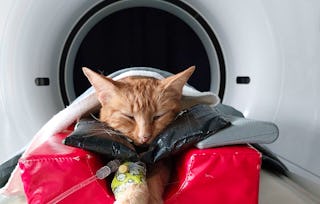This unique course was developed by veterinarians at the world-renowned University of California, Davis School of Veterinary Medicine. The course will address horsemanship from a welfare perspective, within the context of “The Five Freedoms” of animal welfare. We’ll explore equine physiology, behavior and basic needs including housing, nutrition, hygiene and disease management. You’ll learn how to perform basic tasks to assess the overall condition of the horse and identify problem areas. We’ll also examine the specialized needs of the equine athlete and the major responsibilities we as owners, handlers or competitors must assume in order to ensure the health and welfare of our equine companions. Finally, we’ll look several special topics in equine welfare including disaster planning and the international welfare efforts now in place to protect working horses and other equids in key industries such as racing, international competition, tourism and even mining. By the conclusion of the course, you will be well equipped to develop a comprehensive welfare plan for any horses in your care.

Equine Welfare and Management

402 reviews
Skills you'll gain
Details to know

Add to your LinkedIn profile
6 assignments
See how employees at top companies are mastering in-demand skills

There are 6 modules in this course
In this module, you will be able to identify the parameters of normal health in a horse. You will be able to measure a horse’s vital signs, including temperature, pulse, and capillary refill time, or CRT. You will be able recognize ranges of what are considered normal vital signs for the species, breed and individual horse. You will be able to monitor these normals over time to detect changes and alert a veterinarian to a problem.
What's included
12 videos2 readings1 assignment3 discussion prompts
In this module, you will be able to discuss the water needs of a the horse. You will be able to manage and meet those needs in a variety of situations. You will be able to discuss dehydration and be able to test for a horse's level of hydration. You will be able to properly assess hydration status and will have some knowledge of ways to prevent and react to dehydration. You will be able to identify essential parts of a horse's digestive system. You will be able to discuss the characteristics of a horse's digestive system and be able to develop a nutritional plan suitable for your horse. You will be able to successfully communicate with your veterinarian about your horse's water and nutrition needs.
What's included
5 videos1 assignment3 discussion prompts
In this module, you will be able to discuss proper husbandry for your horse. You will be able to identify the second of the five freedoms – freedom from discomfort. You will be able to recognize the importance of creating a proper and safe environment. You will also be able to analyze best practices for proper flooring, bedding, footing, exercise, and safety for both you and your horse. You will be able to review the steps needed for emergency preparedness, evacuation, and rescue situations. You will be able to develop a safety plan utilizing the standards of care for your facility.
What's included
8 videos1 assignment2 discussion prompts
In this module, you will be able to discuss common injuries and diseases that can afflict horses. You will be able to identify the characteristics of the fit horse and the impact of fitness in injury prevention. You will be able to recognize common symptoms of illness, discomfort, and pain and the importance of hoof and dental care. You will be able to review common fly management and deworming practices. You will be able to prepare a vaccination plan for disease prevention.
What's included
9 videos1 assignment3 discussion prompts
In this module, you will be able to discuss normal and abnormal equine behavior. You will be able to identify how equine psychology shapes equine behavior. You will also be able to distinguish the cues horses use to communicate with each other. You will be able to recognize the importance of reading their physical and mental state of mind. You will be able to describe equine social hierarchies. You will be able to identify common abnormal behaviors and corrective strategies.
What's included
7 videos1 assignment3 discussion prompts
In this module, you will be able to discuss the human-equine interaction. You will be able to recognize the special responsibilities we have towards equine athletes, working equines, and performance horses. You will also be able to understand how best to care for older horses and describe issues associated with older and unwanted horses. You will discuss the issues of unwanted and rescue horses and international welfare issues. You will analyze factors that can induce fear in horses and explain stressors on competition and working horses.
What's included
9 videos1 reading1 assignment2 discussion prompts
Instructor

Offered by
Explore more from Animal Health
 Status: Preview
Status: PreviewUniversity of Florida

The University of Edinburgh
 Status: Preview
Status: PreviewThe University of Edinburgh
 Status: Preview
Status: PreviewThe University of Edinburgh
Why people choose Coursera for their career

Felipe M.

Jennifer J.

Larry W.

Chaitanya A.
Learner reviews
- 5 stars
89.55%
- 4 stars
8.70%
- 3 stars
0.74%
- 2 stars
0.49%
- 1 star
0.49%
Showing 3 of 402
Reviewed on Dec 11, 2023
Outstanding course. Effective instructor. Well presented and covers a wider variety of equine topics than I expected.
Reviewed on Jul 12, 2020
LOVED the accessibility and information given in this course. Will definitely be of great help when become a Vet !
Reviewed on Oct 25, 2020
Beyond my expectations,it was more than a basic or introductory course,it covered all materials even though not in full details(expected ).Great I took the course.Easy to understand.

Open new doors with Coursera Plus
Unlimited access to 10,000+ world-class courses, hands-on projects, and job-ready certificate programs - all included in your subscription
Advance your career with an online degree
Earn a degree from world-class universities - 100% online
Join over 3,400 global companies that choose Coursera for Business
Upskill your employees to excel in the digital economy
Frequently asked questions
To access the course materials, assignments and to earn a Certificate, you will need to purchase the Certificate experience when you enroll in a course. You can try a Free Trial instead, or apply for Financial Aid. The course may offer 'Full Course, No Certificate' instead. This option lets you see all course materials, submit required assessments, and get a final grade. This also means that you will not be able to purchase a Certificate experience.
When you purchase a Certificate you get access to all course materials, including graded assignments. Upon completing the course, your electronic Certificate will be added to your Accomplishments page - from there, you can print your Certificate or add it to your LinkedIn profile.
Yes. In select learning programs, you can apply for financial aid or a scholarship if you can’t afford the enrollment fee. If fin aid or scholarship is available for your learning program selection, you’ll find a link to apply on the description page.
More questions
Financial aid available,

